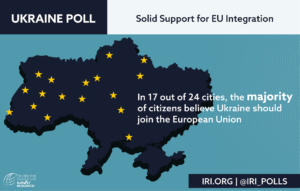U.S. Special Representative for Ukraine Kurt Volker says Russia needs to release the Ukrainian sailors taken captive in the Kerch Strait in late November by Christmas or “before the new year,” VOA reports.
Volker spoke with VOA on Monday in Washington, explaining that the United States and its Western allies are considering a number of options to prevent Russia from asserting any more “unilateral control” in the shared waters of the Azov Sea.
 The U.S. response to Russian aggression must be clear-eyed and hard-headed as profound American interests are at stake, according to members of the Transatlantic Democracy Working Group. This includes making it plain to our European allies that Ukraine is first and foremost a European interest, argue Susan Corke, a senior fellow at the German Marshall Fund, Norman L. Eisen, a senior fellow at Brookings, and Jeffrey Gedmin, editor-in-chief of The American Interest.
The U.S. response to Russian aggression must be clear-eyed and hard-headed as profound American interests are at stake, according to members of the Transatlantic Democracy Working Group. This includes making it plain to our European allies that Ukraine is first and foremost a European interest, argue Susan Corke, a senior fellow at the German Marshall Fund, Norman L. Eisen, a senior fellow at Brookings, and Jeffrey Gedmin, editor-in-chief of The American Interest.
Of course, Russia is not a rising power like China. Nor are we suggesting Americans fight Russians in Ukraine. Rather, we are arguing that it is finally time for us to have a vision and strategy of our own, and that we will never get anywhere until we’re ready to push the Kremlin back, they write for The American Interest:
 For the likes of Vladimir Putin, deterrence is respected. Weakness is provocative. In this instance, how to show strength? It’s high time we take full measures in order to allow Ukraine properly to defend itself. That must start with a substantial increase in the supply of lethal weapons to Kyiv. Sanctions should be expanded as well, both against Russian goods that move by ship and Russian individuals involved in maritime activities.
For the likes of Vladimir Putin, deterrence is respected. Weakness is provocative. In this instance, how to show strength? It’s high time we take full measures in order to allow Ukraine properly to defend itself. That must start with a substantial increase in the supply of lethal weapons to Kyiv. Sanctions should be expanded as well, both against Russian goods that move by ship and Russian individuals involved in maritime activities.
U.S. support for Ukraine hinges on the chairmanships of key Congressional committees, said Nadia Diuk, a vice-president of the National Endowment for Democracy. “Many of the people returning to Congress, such as Senator Bob Menendez from New Jersey, are good news for Ukraine and have been strong supporters of Ukrainian issues for many years,” she told the Kyiv Post:
 “For Ukraine it will be important to see who emerge as heads of the foreign affairs, defense, and appropriations committees.” Diuk also said that many of the younger members of the new intake may know little about the politics of Eastern Europe.
“For Ukraine it will be important to see who emerge as heads of the foreign affairs, defense, and appropriations committees.” Diuk also said that many of the younger members of the new intake may know little about the politics of Eastern Europe.
“Have some of the younger ones taken a class in the history of the Cold War? – Probably not,” she said. She said Ukrainians should ensure that the new members of Congress were equipped with the knowledge to enable them to make informed decisions about Ukraine and the region, such as on providing military aid and imposing sanctions.
Russia’s “nibble warfare” strategy was all too evident in its most recent attack in Ukraine, Hudson’s Seth Cropsey writes for Axios.
Russian officials have spent the last five years depicting Ukraine as a failed state, notes Janusz Bugajski of the Center for European Policy Analysis. Their frustration has visibly increased as Moscow’s forcible annexation of Crimea and its proxy war in Donbas only served to strengthen Ukraine’s resolve. Ukraine’s crucial achievement has been to resist the Kremlin attack by regaining its distinct identity and history, which undergird its commitment to building a successful state.
Tensions between Washington and its closest near-peer competitors are increasing, exacerbated by issues like China’s aggression in the South China Sea and Russia’s de facto invasion of Ukraine. Both of these situations threaten to upend regional and global stability, the Soufan Center notes.
![]() The West is searching for a response to Russia’s ongoing malfeasance, including its recent attack on Ukraine in the Black Sea and its just-revealed effort to “muck around” in U.S. 2018 midterm elections, Brookings adds. These are the latest in a long sequence of transgressions on the part of the Kremlin, ranging from the invasion of Georgia, to the violation of Crimea and Eastern Ukraine, to interference in the democratic processes of NATO member states, perhaps most dramatically seen in Putin’s assault on the 2016 U.S. presidential election. As a result, on both sides of the Atlantic, democratic values and institutions—and the trans-Atlantic alliance predicated upon them—are at risk.
The West is searching for a response to Russia’s ongoing malfeasance, including its recent attack on Ukraine in the Black Sea and its just-revealed effort to “muck around” in U.S. 2018 midterm elections, Brookings adds. These are the latest in a long sequence of transgressions on the part of the Kremlin, ranging from the invasion of Georgia, to the violation of Crimea and Eastern Ukraine, to interference in the democratic processes of NATO member states, perhaps most dramatically seen in Putin’s assault on the 2016 U.S. presidential election. As a result, on both sides of the Atlantic, democratic values and institutions—and the trans-Atlantic alliance predicated upon them—are at risk.
On December 12, Governance Studies at Brookings will cohost an event with the bipartisan Transatlantic Democracy Working Group (TDWG), featuring an expert panel that will discuss the threats emanating from Russia and elsewhere to security, democracy, and the transatlantic alliance—and what the alliance can and should do about it.
How trans-Atlantic alliance should counter Russian aggression
Wednesday, December 12, 2018, 10:00 – 11:30 a.m. The Brookings Institution, Falk Auditorium, 1775 Massachusetts Ave, NW, Washington, DC







